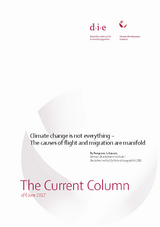The Current Column
Climate change is not everything – The causes of flight and migration are manifold
Schraven, BenjaminThe Current Column (2017)
Bonn: German Development Institute / Deutsches Institut für Entwicklungspolitik (DIE) (The Current Column of 6 June 2017)
Bonn, 6 June 2017. The subject of “climate migration” – the interrelation between climate change and human migration – is gaining increasing public attention and political relevance at a time of numerous refugee crises and the (anti) climate protection policies of US president Donald Trump. Even before Trump announced the US departure from the Paris climate treaty German foreign minister Sigmar Gabriel was already concerned that such a step would contribute significantly to even greater flows of migrants making their way to Europe. At the end of May the Task Force on Displacement of the United Nations Framework Convention on Climate Change (UNFCCC) discussed ways of dealing with the subject of displacement as a consequence of climate change. What significance, then, should the factor of climate change be assigned in the context of flight and migration, and what conclusions can be drawn from it? Researchers and various international organisations have been examining the role played by climate change on migration decisions for some time now, and sometimes find the issue a difficult one. For example, the “Atlas of environmental migration” recently published by the International Organisation for Migration (IOM) uses numerous, often highly complex illustrations to visualise and explain the phenomenon of environmental or climate migration in all of its various facets. However, 160 pages later the reader is still somewhat perplexed. What remains is the impression that this is all highly complex. And the issue is truly complex - as are the migration decisions themselves. They may be influenced by ecological factors, but often many other motives of an economic, political, social, cultural or demographic nature. There is much to indicate that the still widespread assumption of an automatic link between climate change and migration – in keeping with the formula "less rain or more drought leads to increased migration" - needs to be called into question more strongly. General "eco determinism" such as this is not empirically tenable. The people who suffer in particular from the effects of climate change are above all very poor population groups in widespread areas of the Global South. They often lack the necessary resources to migrate at all, or these are eroded further by the effects of climate change, such as in the form of failed harvests. It is therefore not uncommon for the consequences of global warming to be manifested as chronic immobility rather than mobility. Human migration, then, is not necessarily a good indicator of how strongly climate change and its consequences effect people in Africa, Asia or Latin America. Acute flight situations often also arise from complex conflicts. Although the term "climate refugee" still finds regular use, armed conflict is in fact the main global cause of flight. Although environmental factors may play a role in the outbreak of armed disputes, alongside historic, ethnic or political factors, identifying climate change as the primary cause of, for example, the Syrian war, as is frequently suggested at least in media reports, is completely unfounded. Similarly, in the case of natural disasters there are various factors, such as the existence or capacity of local disaster prevention and the general capability and legitimacy of state structures, that determine whether a disaster results in flight or not. In striving to achieve better solutions and greater protection for refugees and migrants it is therefore essential to examine the role of climate change in migration and flight processes. However, in the struggle to achieve specific political responses, the question of whether global warming was the dominant trigger of this flight or that migration is often difficult to answer, due to the reasons stated above. Instead, we also need to find an answer to the question of people whose reasons for fleeing are definitely not based on ecological factors, but are also not covered by the very precise definition of the Geneva Convention Relating to the Status of Refugees. The convention refers solely to individual or group persecution. Better solutions also need to be found for "non-convention refugees", funded by the rich industrialised countries of the Global North. Because responsibility here is not derived solely from (historic) greenhouse gas emissions; colonial exploitation and unfair world trade also play a role. Whilst these may not be principal reasons for conflict, flight and migration, they nevertheless play their part.


